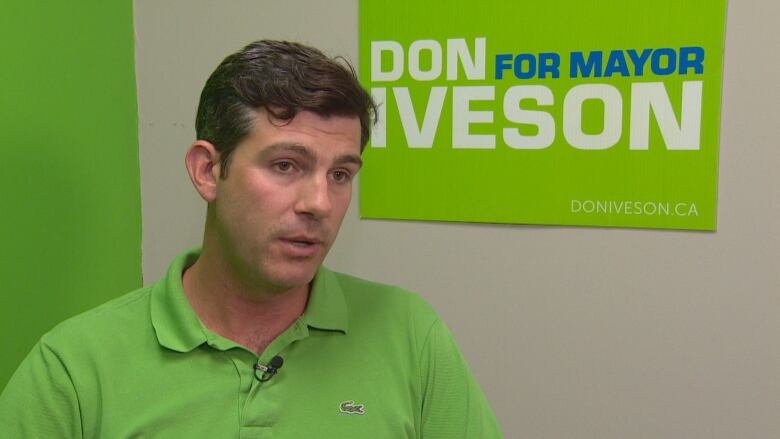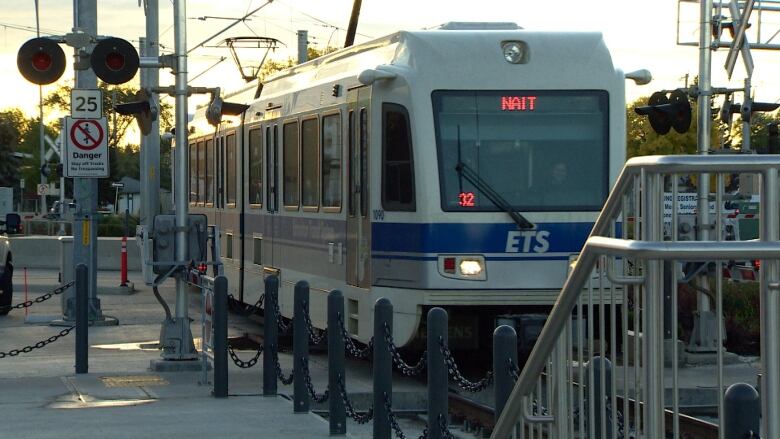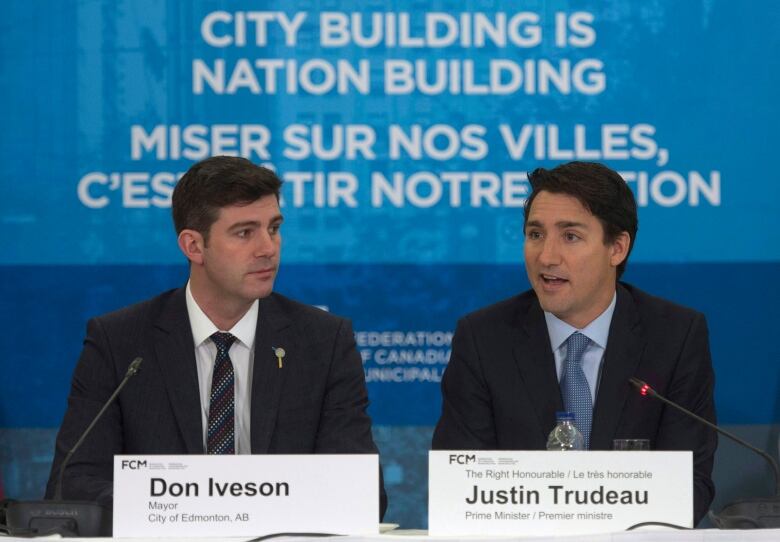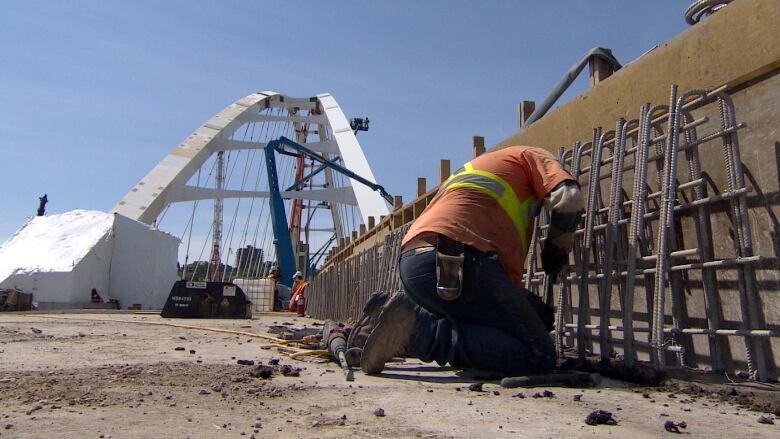Don Iveson reflects on bike lanes, infill and lessons learned from infrastructure failures
Edmontons mayor seeking second mandate in Oct. 16 municipal election

Delays with major infrastructure projects like the Metro Line LRT and the Walterdale Bridge presented the biggest challenge for Don Iveson in his first term as mayor of Edmonton.
"We've learned a ton from what went wrong," Iveson told CBC News in an interview about his record as mayor.
He said council learned the most from the signalling problems that delayed opening on the Metro Line LRT and to this day keep trains from running at full frequency.
"What happened with that contract cannot happen on the Valley Line because of the way we've structured the contract differently."
- New Walterdale Bridge finally opens to traffic Monday
- Don Iveson elected Edmonton's next mayor
- Sealed with a kiss: Annexation deal signed by mayors of Edmonton, Leduc County
- Metro LRT line has become 'inside joke,' Edmonton mayor says
Iveson is running for mayor in this fall's municipal election. Many people think he will win a second term. Although Iveson is facing at least 10 candidates in the 2017 mayoral race, none have the profile or funding of his opponents in 2013 fellow councillors Karen Leibovici and Kerry Diotte.
Back then, Iveson was a fresh-faced, two-term city councillor pitching a vision of Edmonton as a vibrant, growing place for young people to live and work.
He won 62 per cent of the vote in the Oct. 21, 2013 election, a strong mandate for the aspirational policies of his campaign.
"Our campaign platform, our promises to you, are based on your imagination, your ambition, your new feeling of hope and optimism in Edmonton," Iveson said in his victory speech that night. "A more confident swagger for Edmonton."

Iveson's four years as mayor featured successes such as the start of construction on the Valley Line LRT and the completion of Rogers Place.
However, problems with critical infrastructure projects cast an embarrassing shadow over these accomplishments and raised questions about council's ability to hold city administration to account.
Three projects caused the most heartache: the Walterdale replacement bridge, the 102nd Avenue bridge over Groat Road and the Metro Line LRT.
The Metro Line was 17 months behind schedule when it opened in September 2015.
The line snarled traffic in the busy Kingsway area, aggravating drivers and delaying buses.
After crawling between the NAIT and MacEwan stations at a snail-like 25 km/h for the first 18 months of operation, trains started running at full speed in February 2017. But the line still isn't at full capacity.
Completionof the 102nd Avenue bridge over Groat Road was delayed nearly a year, exasperating commuters and angering businesses that saw a drop in foot and car traffic.
The Walterdale replacement bridge was just partially opened to traffic for the first timeMonday, two years behind schedule. But construction continues on the north part of the bridge, and the city doesn't expect full completion of the shared-use paths until next year.
The project will come in under budgetbecause the contractor will pay $17,500 for each day the project falls behind schedule. Nonetheless, for some Edmontonians, thebridge has become a symbol of municipal incompetence.

Council took the issues highlighted by these delays seriously, Iveson said. They fired staff and changed policy. But he acknowledged it will take time for people to notice.
"I get it. Until they see the results, people are still wondering," he said. "But I'm confident council has taken these issues to heart and made the appropriate changes and will rigorously hold contractors and staff accountable around project management."
'Waste of time'
Iveson's push for Edmonton to adopt progressive policies on development and transportation has grated on those who want to preserve the character and lot sizes in older neighbourhoods, and who prefer the city to focus more on expanding and improving roads in growing areas like southwest and northeast Edmonton.
In 2013, Iveson campaigned on building more infill in mature neighbourhoods to expand the availability of townhouses, narrow-lot and semi-detached housing.
The mayor and council also approved the construction of the downtown bike-lane network which opened over the summer.

But infill and bike lanes have become irritants to voters in the 2017 campaign. Infill projects have angered people because of poor practices by some builders, and structures that are narrower and taller than other houses in the neighbourhood.
Concerns are coming up on the doorsteps as council candidates canvass the city ahead of the Oct. 16 election.
"This infill thing has got me a little troubled," Don Voselgang told Ward 4 candidate Tricia Velthuizen while she campaigned in his York neighbourhood earlier this month.
"Some of these neighbourhoods just weren't designed to have three and four and five times as many residences in them."
Even though he is a cyclist, Philip Valk, another York resident, said he couldn't understand the city's focus on bike lanes.
"We're not Vancouver," he said. "We're a winter city. How long can you ride your bike safely?"
Another man in the southwest Edmonton neighbourhood of Wedgewood Heights was more blunt.
"Waste of time. Millions and millions of dollars for a thousand people to ride bikes in the winter," he said.
'I'm working for everybody'
Iveson rejects any suggestion the city is favouring the core to the detriment of the suburbs.
"What I'm really concerned about, actually, is a narrative of division. And we've seen that in other cities," he said. "And I'm a uniter and collaborator and so I'm working for everybody around the whole city."
As an example, Iveson said council built new recreation centres in the suburbs and is extending the LRT to the southeast and western parts of the city.
He defends the choice to build bike lanes because that's what people want in what he calls the fastest growing and youngest city in the country.
"I think it benefits everybody to have a strong workforce, to have transportation alternatives in and out of our city, and to be able to for parents and grandparents, to think about what it's going to take for their kids and grandkids to choose to stay in Edmonton," he said.
"Because that's what this infrastructure is about. That's who it's ultimately for and that's a transformation that we need to make and that most big cities go through."
- Edmonton ponders 'missing middle' infill in older neighbourhoods
- Councillors push for answers on Valley Line LRT traffic impacts
- Buckled girders over Groat Road weren't properly braced
Concerns over infill have prompted council to take a second look at what was once a one-size-fits-all policy.
Now the focus is on concentrating this type of construction on mature neighbourhoods with older homes that are close to transit.
Iveson admits more needs to be done to move infill projects from being expensive "boutique" options for people who have the money to more affordable rowhousesand four-storey condos what he calls the "missing middle" of residential options.
"It's coming, but really this is a generational change that's underway in terms of the policy work. It's going to take a few more years to deliver, particularly that missing middle that we've been talking about just this fall," he said.
- Amazon's HQ2 opportunity a 'tasty morsel,' says Edmonton mayor
- Edmonton mayor calls for resignation of senator who suggested Indigenous Canadians aren't citizens
- Northlands Coliseum will close permanently at end of this year
When Iveson was sworn in as mayor, he stepped into the shoes of his formidable predecessor Stephen Mandel, who many credit with jump-starting Edmonton's transformation with his push to build Rogers Place and expand the LRT to Century Park.
If Iveson wins a second term as mayor on Oct. 16, he hopes to continue his own city-building vision. By 2021, he wants the first phase of the Valley Line open and construction to be underway on the western section. He wants more affordable housing built around transit and more regional cooperation so more big investments can come to the area.

And he wants publications like Lonely Planet, which recently characterized Edmonton as the dull counterpart to a more vibrant Calgary, to talk about how "cool" the city is.
He also wants to make it easier for his children to stay in Edmonton when it comes time for them to make that decision.
"That comes with confidence. That comes with reaching a population of a million and making those big-city planning and building decisions that will allow us to compete in a fiercely competitive environment."












_(720p).jpg)


 OFFICIAL HD MUSIC VIDEO.jpg)
.jpg)



























































































